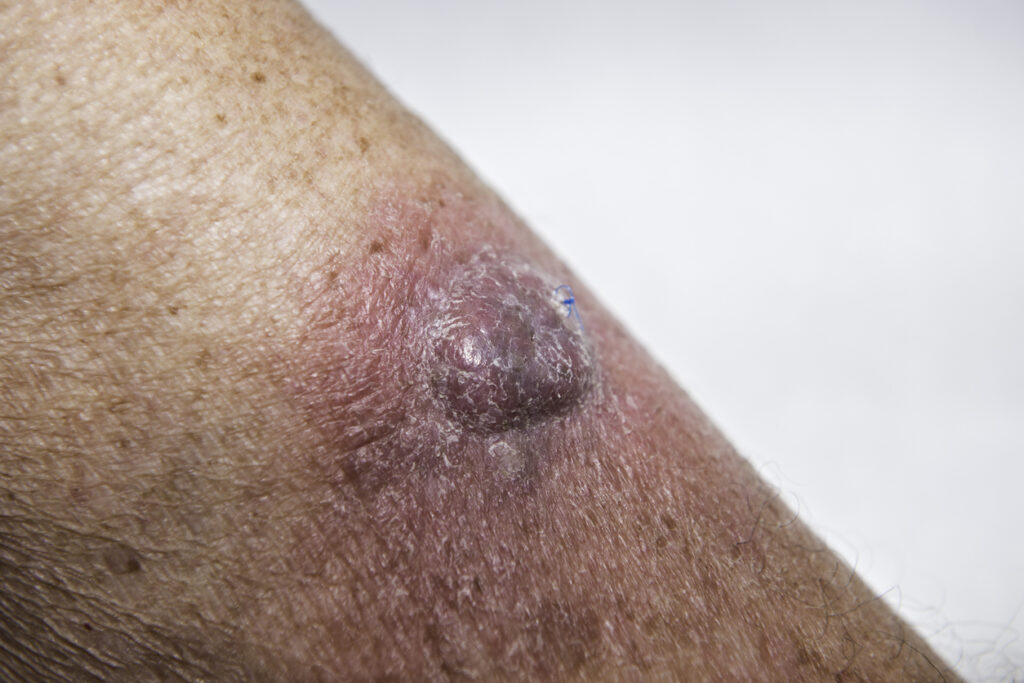Cemiplimab (Libtayo, Regeneron Pharmaceuticals, Inc.) produced a statistically significant and clinically meaningful benefit in high-risk cutaneous squamous cell carcinoma (cSCC) after surgery, according to the Phase 3 C-POST trial.
The results were shared during an oral session at the 2025 American Society of Clinical Oncology (ASCO) Annual Meeting in Chicago, IL, and simultaneously published in the New England Journal of Medicine (NEJM).
Cemiplimab is an immunotherapy drug that works by blocking the PD-1 protein.
Results from the C-POST trial shared earlier this year established cemiplimab as the first immunotherapy to show a statistically significant and clinically meaningful benefit in high-risk cSCC in the adjuvant setting.
The new data provide additional insights for the primary endpoint of disease-free survival– defined as time from randomization to the first documented disease recurrence or death – as well as first results for the secondary endpoints of freedom from locoregional recurrence, freedom from distant recurrence and overall survival (OS).
Efficacy Results
With a median duration of follow-up of 24 months (range: 2-64 months), efficacy results for cemiplimab compared to placebo, were as follows:
– 68% reduction in the risk of disease recurrence or death, with median DFS not reached for Libtayo-treated patients (versus 49 months for placebo)
o At two years, DFS was 87% with Libtayo versus 64% with placebo
– 80% reduction in the risk of locoregional recurrence
– 65% reduction in the risk of distant recurrence
Updated OS data from a recent data cut, with approximately six months of additional follow-up after the primary analysis for DFS, suggest an emerging OS benefit for cemiplimab vs. placebo.
“While surgery and radiotherapy remain the cornerstones of treatment for high-risk cutaneous squamous cell carcinoma, there is a critical unmet need for systemic therapies to help prevent relapse and metastasis to ultimately drive better outcomes for patients,” says Danny Rischin, MD, MBBS, FRACP, Research Lead, Head and Neck Cancer and Cutaneous SCC, Department of Medical Oncology at the Peter MacCallum Cancer Centre in Melbourne, Australia, and lead investigator of the trial, in a news release. “The Phase 3 C-POST trial demonstrates that cemiplimab is a highly active therapy in high-risk CSCC, with clinically meaningful outcomes across primary and secondary endpoints and exceptionally low rates of locoregional and distant recurrence.”
“These results show the continued promise of Libtayo in non-melanoma skin cancers,” adds Israel Lowy, MD, PhD, Clinical Development Unit Head, Oncology, at Regeneron. “Libtayo is the first medicine to demonstrate a statistically significant benefit in patients who have high-risk features for recurrence after resection of cutaneous squamous cell carcinoma and has the potential to become a new standard of care in the adjuvant setting. We are working with global regulatory authorities to bring this new option to patients as quickly as possible.”
Exploratory Analysis
Additionally, an exploratory analysis of the C-POST results showed similar rates of DFS regardless of PD-L1 expression level. Specifically, cemiplimab reduced the risk of disease recurrence or death by 72% in tumors with PD-L1 ≥1% and by 68% in tumors with PD-L1 <1, compared to placebo.
Safety was assessed in 205 patients in the cemiplimab arm and 204 patients in the placebo arm. Adverse events (AEs) of any grade occurred in 91% and 89% of patients in the cemiplimab arm and the placebo arm, respectively. Grade ≥3 AEs occurred in 24% and 14% of patients in the cemiplimab arm and the placebo arm, respectively.
The most common AEs occurring in at least 10% of patients in the Libtayo arm were fatigue, pruritus, rash, diarrhea, arthralgia, hypothyroidism and maculo-paplar rash. The only grade ≥3 AE that occurred in more than 2% of patients in the cemiplimab arm was hypertension. Treatment discontinuations due to AEs, regardless of attribution, occurred in 10% and 2% of patients in the cemiplimab arm and the placebo arm, respectively. Two patients experienced an AE leading to death in each arm.
The potential use of cemiplimab described above is investigational, and its safety and efficacy has not been evaluated by any regulatory authority for this indication. Regulatory applications have been submitted for cemiplimab in the treatment of adjuvant CSCC in the United States and European Union.


